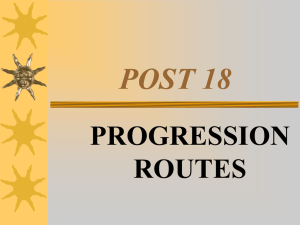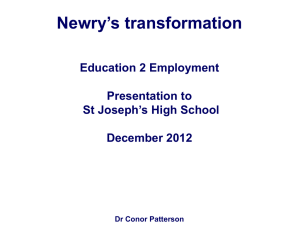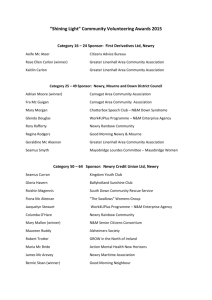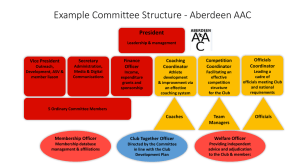Volunteering
advertisement
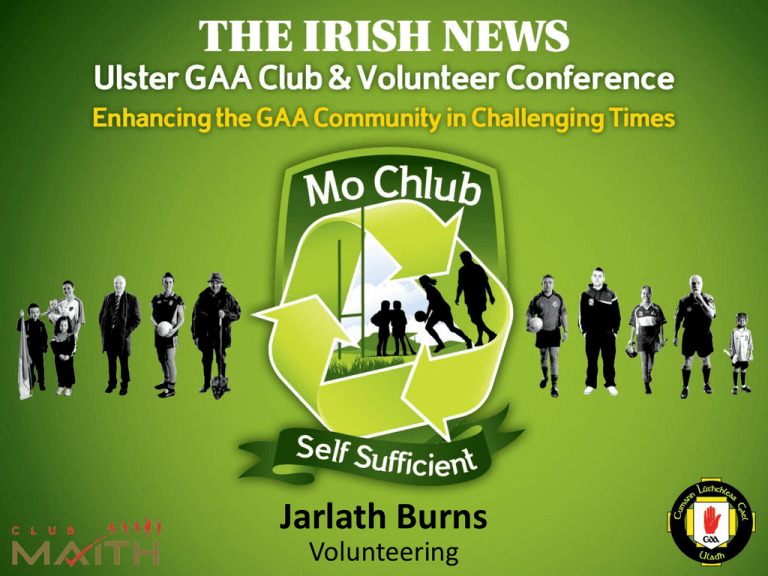
Jarlath Burns Volunteering Exercise 1: Why I am involved in my Club? Why do people Volunteer? • Because they were asked! • They grew up with GAA in their family • They moved into a new area and wanted to get to know the community. • They enjoy it • It keeps them busy/occupied • They make and keep friendships • It helps their career Why do people Volunteer? • They got involved via their children • They wanted to “give something back” after their playing career. • They want to be associated with something positive and successful • It was a family tradition Why do people Volunteer? • Because they came to a new member's night and felt very welcome • They became unemployed for a while and felt their occupation had a lot to offer • They had retired early and had an interest in GAA and had now "time on their hands". Club Maith • Most volunteers across society generally are women … but often our GAA Clubs aren’t in a position to capitalise on that. • Fewer older people tend to volunteer … but those who do tend to deliver more hours of input than anyone else! Why Do People Remain Volunteers? • They feel valued; appreciated; and respected • They’re part of a group and feel part of “the team” • It gives them a sense of pride … the GAA is a “badge of honour” • Their work is productive and worthwhile. Why do People Not Volunteer? • They weren’t asked! • They think they don’t have the skills required • They think they’ll be over-burdened with work … and will never “escape” from it • They don’t have the confidence …or the time … or the interest Why do People Not Volunteer? • They don’t know how to get involved • Lack of interest/enthusiasm • Clubs don’t sell themselves/lack of marketing/communication • They don’t know about the GAA or our Club (much as we might think they do) … or, worse, they have a poor image of them. What are the main tasks in a club? ‘Warm Body’ Recruitment • • • • • Distribution of brochures Posters Speaking to groups Notices in appropriate media Word of Mouth Targeted Recruitment • The targeted campaign requires a carefully planned approach to a small audience. • Use this method when you are trying to recruit volunteers that need to have specific skills or not commonly found characteristics. • A targeted campaign requires, at the outset, that you answer several questions: Targeted Recruitment • • • • What do we need? Who could provide this? How can we communicate with them? Working through such questions will help you identify and locate the volunteers that you need. Once you locate a source of such volunteers, simply take your recruitment message directly to them. Examples of Targeted Recruitment • • • • • • • Bus Driver Child Protection Officer Insurance Officer Scór Officer Drugs Awareness Officer ICT Co-Ordinator Team Doctor How can we improve our volunteer base? • First, we need to let people know that our Club (and the GAA) is: • Open and welcoming to them and to everyone else: it should be a ‘place of doors, not a place of walls” • An energetic place, full of enthusiastic people. • Making a major contribution (in all sorts of ways). • A place where we don’t waste people’s time (i.e. we’re punctual and well-organised). • Safe (especially for children) and well run • Part of a huge, vibrant and successful organisation. Bringing the New Volunteers on Board Identifying our volunteers is only part of the task. Once they’re willing to help, best practice tells us to: • Bring them along and formally introduce them to the Club • Let them know “who’s-who-and what’s- what” • Explain what it is you want them to do and make sure it’s a specific, clear-cut piece of work …bringing the New Volunteers on Board • Avoid, at all costs, over-loading them: don’t throw anyone in at the deep end … and be clear about the time commitment involved • Provide them with support … maybe get an existing volunteer to mentor them • Child Protection and other issues mean we shouldn’t just let people “turn up un-announced” and walk into a role in our Club. We need to be sure we have the right people in the right places. • A GAA Club should not just be an “open house” for people. Keeping Our Volunteers On Board It’s all-too-easy to take volunteers for granted. To keep everyone enthusiastic and refreshed we should: • Check that we haven’t overloaded anyone and keep feeding back to them. • Give them variety: don’t leave anyone in the same place/role for too long. • Provide training: that’s what the Ulster Council’s CPD programme is for! • Constantly acknowledge our volunteers, formally and informally. area of Club business we need help with… administration Web site Grant forms PR coaching Go games Links with schools culture/heritage Scór Club history Language facilities Cleaning Grass-cutting Maintenance fund-raising Lotto Tickets Gala Dinner Sponsorship teams Transport Gear Referee Liaison others who could help us? who’ll ask them? Getting out to Members • • • • • • Club Notes Website Word of Mouth Text Message E mail Letter Database of Members Agnew Kathleen 12 Carrive Road Silverbridge Newry Agnew Peter 12 Carrive Road Silverbridge Newry Bellew Brendan Glassdrummmond Silverbridge Newry Bellew Laura Glassdrummmond Silverbridge Newry Boyle Paudie Newry Road Silverbridge Newry Bradley Jackie 12 Moylin Close Silverbridge Newry Bradley Martin 12 Moylin Close Silverbridge Newry Burns Coleman 21 East Cloghogue Road Creggan Newry Burns Rosemary Longfield Road Forkhill Newry Burns Jerome Longfield Road Forkhill Newry Burns Suzanne Tullymacrieve Mullaghban Newry Burns Jarlath Tullymacrieve Mullaghban Newry Burns Paudie Glassdrummond Road Silverbridge Newry Byrne Brendan 127 Newry Road Silverbridge Newry Byrne Eugene 127 Newry Road Silverbridge Newry Byrne Marie 127 Newry Road Silverbridge Newry Byrne Kevin 127 Newry Road Silverbridge Newry Callaghan Jim 39 Silverbridge Road Silverbridge Newry Callaghan Brian Ballsmill Road Silverbridge Newry Campbell Adrian 32 Carnally Road Silverbridge Newry Using the Database • Liam a chara I am writing to all our members with a view to sharing out the tasks which have to be carried out around the club every week. As you know, our club is always on the lookout for new volunteers. As a valued member, we would appreciate a volunteer commitment from you if you would be prepared to share an hour or two each week to help us out. I have attached a list of tasks which need to be done every week. None of these jobs last any more than one hour and will be reviewed every three months, so the minimum commitment you can give is one hour per week and for three months. If after this time you wish to end your involvement, that is OK, but we would hope you would continue to help us out. Please take a look at the attached sheet on which we have listed all tasks which take about an hour to accomplish. I would be grateful if you could simply tick the task that you can do and sign it. You can post it back, or leave it into the club. I appreciate your help. Le meas, Cathaoirleach an Chlub Registration Night • Brand New Audience • Fertile Ground for New Recruits • Parents are usually keen to get involved, but How can they become Involved? • They think if they don’t have coaching skills or a playing background, they cannot contribute. • It’s up to us to give them tasks that can make them feel valued! Registration Form • Volunteer Details: • Are you available to help out with some club activities: YES / NO (Please Delete As Appropriate). If Yes circle what you are interested in: Coaching / Admin / Food / Hospitality / First Aid / IT / Public Relations / Photography / Entertainment / Transport / Fundraising / Match Days / Other? Registration Form • After the Registration Night, the information gathered is placed on the Database of Members and you have a list of people and their skills. • These people are then contacted by a friend on the committee and given times, procedures and other information relevant to their volunteer commitment. • If necessary, a rota is then drawn up to ensure that everyone who has volunteered gets a chance to do what they have volunteered for. • Work on the basis of a small commitment at first which can grow if the person wants to increase their involvement. Sure Start Programme • ABC’s of Athleticism i.e. Agility, Balance, Coordination and Speed tasks suitable for this phase of the LTPD • RJT of Athletics i.e. Tasks to include Running, Jumping and Throwing • These two areas will incorporate most of the warm up material used at this stage of a child’s development • CPKS i.e. Catching, Passing, Kicking and Striking balls of various sizes and textures • These tasks will make up the bulk of Part 2 of the session. • Modified and Adapted games to suit all ability groups • These activities will make up Part 3 of a session Sure Start Programme • To run this programme requires all parents to STAY! • To enrol the child on the programme, you must give a One Hour Commitment • Course is One Hour per week over the Winter usually on a Sunday • It is a series of stations from which children move to the next one. • Parents encourage each child on the station. • No ball/athletic/coaching skills required. Go Raibh Maith Agaibh
